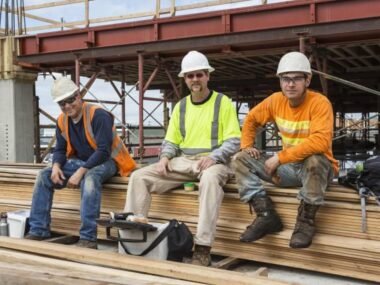The United States construction industry is experiencing significant growth, leading to a high demand for skilled workers. For international professionals, this creates a valuable opportunity to find high-paying construction jobs that offer visa sponsorship. If you’re looking to build a career in the U.S., this guide provides the clear, actionable information you need to navigate the process successfully.
Why the US is Actively Seeking Foreign Construction Workers
The demand for construction labor in the United States isn’t just a trend; it’s a critical need. A combination of factors, including a domestic labor shortage and a surge in new projects funded by legislation like the Infrastructure Investment and Jobs Act, has created hundreds of thousands of job openings.
U.S. construction companies are increasingly looking to the global talent pool to fill these gaps. They need skilled tradespeople to complete projects on time and are often willing to sponsor work visas for qualified candidates who possess the right experience and skills.
Takeaway: The opportunity is real and driven by a genuine labor shortage in the U.S. construction market, creating a favorable environment for foreign job seekers.
Understanding Visa Sponsorship for Construction Jobs
“Visa sponsorship” means that a U.S. employer has agreed to hire you and will file the necessary immigration paperwork on your behalf. For construction roles, the most common pathway is the H-2B visa.
The H-2B Visa: For Temporary and Seasonal Work
The H-2B visa program allows U.S. employers to hire foreign nationals for temporary, non-agricultural jobs. Construction work often falls into this category, especially for specific, large-scale projects.
- Who is it for? Skilled and unskilled workers in fields with a proven temporary need, such as construction laborers, carpenters, masons, and painters.
- How it works: The U.S. employer must first prove there are not enough U.S. workers available for the job. They then file a petition (Form I-129) with U.S. Citizenship and Immigration Services (USCIS).
- Duration: An H-2B visa is typically granted for the duration of the project, up to one year. It can be extended in increments, up to a maximum of three years.
The EB-3 Visa: For Permanent Skilled Workers
For highly skilled roles or positions where the labor need is permanent, an employer might sponsor an EB-3 visa. This is a more complex, longer process that leads to a Green Card (permanent residency). This is less common for general construction jobs but can be an option for specialized roles like construction managers or highly skilled tradespeople.
Takeaway: The H-2B visa is the most common and direct route for foreign construction workers seeking employment in the USA.
High-Demand Construction Roles and Salary Expectations
While headlines may mention specific figures like $57,000, actual salaries vary significantly based on the role, location, and your level of experience. High cost-of-living areas like California and New York will generally offer higher wages than rural areas.
According to the U.S. Bureau of Labor Statistics (BLS), here are some of the most in-demand construction jobs and their median annual pay ranges to give you a realistic picture:
- Carpenters: Responsible for building, installing, and repairing structures made of wood and other materials. Median pay is around $56,900 per year.
- Electricians: Install, maintain, and repair electrical power, communications, lighting, and control systems. Median pay is around $61,590 per year.
- Plumbers, Pipefitters, and Steamfitters: Assemble, install, and repair pipes and fixtures for water, gas, or other systems. Median pay is around $61,100 per year.
- Welders, Cutters, Solderers, and Brazers: Use hand-held or remotely controlled equipment to join or cut metal parts. Median pay is around $50,890 per year.
- Construction Laborers: Perform physically demanding tasks at construction sites. Median pay is around $43,180 per year.
So, is a salary of $57,000 realistic? Yes, it is a very achievable figure, especially for skilled trades like electricians, plumbers, and experienced carpenters, placing it squarely within the median pay range for many in-demand roles.
Expert Insight: A Recruiter’s Perspective
“We’re seeing unprecedented demand for skilled trades from our construction clients. The biggest hurdle for foreign applicants isn’t a lack of skill; it’s finding a legitimate employer who is set up to handle the H-2B visa process. My advice is to focus on larger construction firms, as they often have the resources and experience to navigate the complexities of sponsorship.”
— David Chen, Construction Recruitment Specialist
Takeaway: High-paying opportunities exist, particularly for skilled trades.1 Researching average salaries for your specific trade and target location will help you negotiate effectively.
Step-by-Step Guide: How to Find and Apply for Sponsored Construction Jobs
Finding a job with visa sponsorship requires a proactive and organized approach.
Step 1: Prepare Your Professional Documents
- Create a U.S.-Style Resume (CV): Keep it concise (1-2 pages). Highlight your hands-on experience, specific skills (e.g., “MIG welding,” “concrete finishing”), and any certifications you hold. Use action verbs to describe your accomplishments.
- Gather Proof of Experience: Collect reference letters from previous employers, photos of your work (a simple portfolio), and copies of any trade school diplomas or certifications.
Step 2: Find Legitimate Sponsoring Employers
- Use Online Job Boards: Websites like Indeed, LinkedIn, and ZipRecruiter are excellent starting points. Use specific search terms like:
- “H2B construction”
- “Visa sponsorship carpenter”
- “Welder seeking sponsorship”
- Check Industry-Specific Sites: Explore websites dedicated to the construction industry, such as Associated General Contractors (AGC) of America or Roads & Bridges job boards.
- Direct Company Websites: Identify large national or regional construction companies (e.g., Bechtel, Turner Construction, Kiewit Corporation) and check their career pages for international hiring information.
Step 3: The Application and Interview Process
- Submit a Professional Application: Follow the instructions carefully and attach your tailored resume.
- Prepare for a Video Interview: Be ready to discuss your experience in detail and express your genuine interest in working in the USA. Test your technology beforehand.
Step 4: The Visa Process
- Employer Petition: If you receive a job offer, the employer will file the Form I-129, Petition for a Nonimmigrant Worker, with USCIS.
- Consular Interview: Once the petition is approved, you will need to complete the DS-160 online visa application and attend an interview at the nearest U.S. embassy or consulate in your home country. You will need to bring your passport, the job offer letter, and the petition approval notice.
Takeaway: A professional resume and a targeted job search strategy are your most important tools. Be patient, as the visa process takes time.
Your Questions Answered: FAQs about US Construction Jobs
1. What are the main requirements to get a sponsored construction job?
The primary requirements are verifiable experience in your trade and, in many cases, at least a basic level of English proficiency for safety and communication on the job site.
2. Can I bring my family with me on an H-2B visa?
Yes, your spouse and unmarried children under 21 can apply for an H-3 visa to accompany you. However, they are generally not permitted to work in the United States.
3. How long does the entire visa process take?
The timeline can vary significantly. After an employer files the petition, it can take several months for approval. The final consular processing can take several more weeks. It’s realistic to expect the entire process to take 4 to 8 months.
4. How can I avoid job scams?
Legitimate employers will never ask you to pay a fee for the job offer or for the visa petition itself (you will have to pay a separate consular fee). Be wary of agents who guarantee a job for a large upfront payment. Always verify the company’s legitimacy through its official website and online presence.
Begin Your Journey
Securing a high-paying construction job in the USA with visa sponsorship is a challenging but highly rewarding goal. The demand for your skills is strong, and with diligent preparation and a focus on finding legitimate employers, you can build a successful career in America.
Next Steps & Official Resources:
- Update Your Resume: Start by tailoring your CV to U.S. standards today.
- Explore Job Boards: Begin your search on the platforms mentioned above to see which companies are actively hiring.
- Consult Official Sources: For the most accurate and up-to-date visa information, always refer to the official U.S. government websites:
- U.S. Citizenship and Immigration Services (USCIS): H-2B Temporary Non-Agricultural Workers
- U.S. Department of State – Bureau of Consular Affairs: For visa application forms and interview information.



